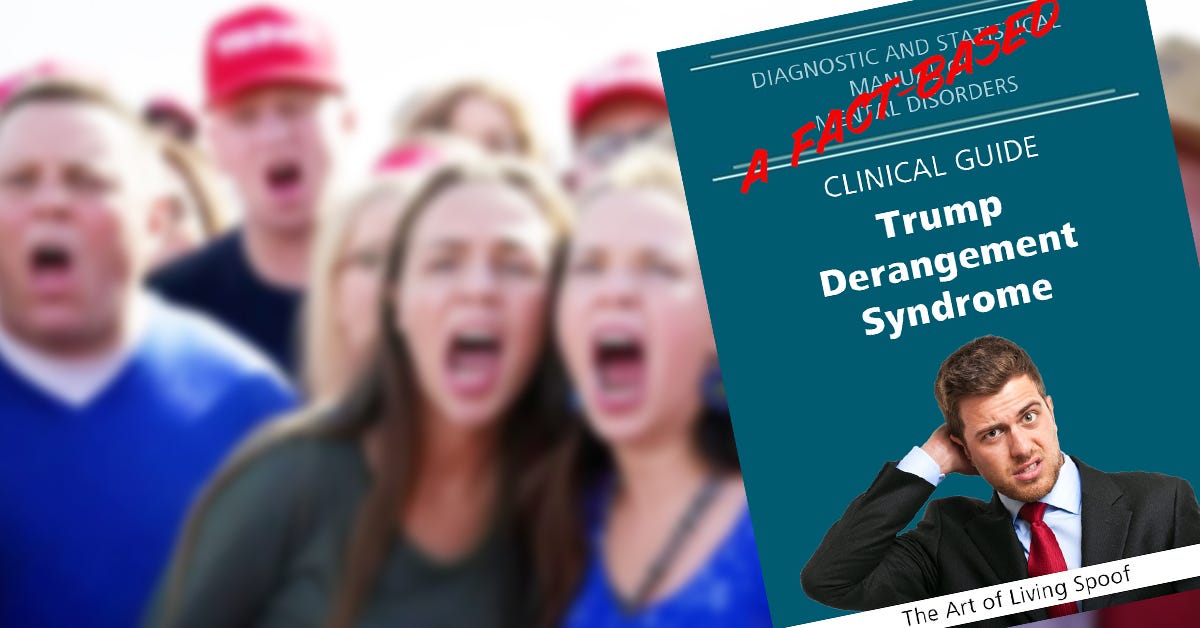Covfefe in the Brain: Trump Derangement Redefined
Liberal psychiatrists seize the narrative. Bigly
Preface: Redefining Trump Derangement Syndrome
Ladies, gentlemen, and those who identify as neither welcome to the cutting edge of political psychiatry!
Today, we embark on a journey to explore a condition that has puzzled the greatest minds of our time (or at least those who haven't been sued into silence by a certain litigious ex-president).
We present to you a groundbreaking entry into the annals of mental health: Trump Derangement Syndrome (TDS), redefined for the discerning liberal palate.
Gone are the days when TDS meant an irrational hatred of the 45th president. No, dear readers, we've reclaimed this term faster than you can say "covfefe."
Our version of TDS isn't about derangement from criticizing Trump; it's about the mind-boggling, reality-bending devotion to a man whose hair has all the authenticity of a three-dollar bill.
Caution: Side effects of reading this entry may include uncontrollable eye-rolling, spontaneous fact-checking, and a sudden urge to register to vote. Consult your sense of humor if symptoms persist.
Trump Derangement Syndrome (TDS)
Diagnostic Criteria
A. Persistent and intense devotion to Donald J. Trump, characterized by at least five (5) of the following:
Unwavering belief in Trump's infallibility despite contradictory evidence or numerous scandals.
Extreme nationalism and a tendency to view Trump as a savior figure capable of protecting society from perceived threats.
Distrust in established institutions, including government agencies, media outlets, and scientific bodies, when they contradict Trump's statements.
Adherence to conspiracy theories that justify suspicions of disliked groups, particularly those criticized by Trump.
Rationalization of contradictory beliefs, viewing Trump as a necessary disruptive force against a corrupt system.
Unquestioning acceptance of Trump's economic policies, including tariffs and tax cuts, despite potential negative impacts on personal finances.
Engagement in echo chambers that reinforce pro-Trump beliefs, leading to consensual validation of reality distortions.
Exhibiting authoritarian tendencies, including a preference for strong, centralized leadership and disdain for democratic processes perceived as chaotic.
B. The symptoms cause clinically significant distress or impairment in social, occupational, or other important areas of functioning.
C. The disturbance is not better explained by the effects of a substance or another medical condition.
Specifiers
Specify current severity:
Mild: Few, if any, symptoms in excess of those required to make the diagnosis are present, and symptoms result in only minor impairment in social or occupational functioning.
Moderate: Symptoms or functional impairment between "mild" and "severe" are present.
Severe: Many symptoms in excess of those required to make the diagnosis, or several symptoms that are particularly severe, are present, or the symptoms result in marked impairment in social or occupational functioning.
Diagnostic Features
Trump Derangement Syndrome (TDS) is characterized by an intense and irrational devotion to Donald J. Trump, often manifesting as a personality cult dynamic.
Individuals with TDS exhibit a profound cognitive dissonance, maintaining unwavering support for Trump despite contradictory evidence or outcomes that may negatively impact their own interests.
A key feature of TDS is the tendency to view complex social and political issues through a simplistic, black-and-white lens, with Trump positioned as the sole solution to perceived societal ills.
This cognitive rigidity often leads to a dismissal of factual information that contradicts pro-Trump narratives, resembling a form of consensual reality distortion within like-minded social groups.
Individuals with TDS may experience heightened emotional responses when their beliefs about Trump are challenged, leading to aggressive defense mechanisms and social isolation from those with differing views.
This can result in significant impairment in interpersonal relationships and occupational functioning.
Development and Course
TDS typically develops through a process of radicalization, often triggered by perceived socio-economic crises or feelings of cultural displacement.
The onset is usually gradual, with individuals becoming increasingly receptive to Trump's rhetoric and policy positions over time.
The course of TDS is often chronic, with symptoms intensifying during periods of political turmoil or when Trump faces legal or political challenges.
Remission is rare without intervention, as the echo chamber effect and confirmation bias tend to reinforce and escalate the condition.
Risk and Prognostic Factors
Temperamental: High levels of authoritarianism, low openness to experience, and high conscientiousness in terms of self-discipline.
Environmental: Exposure to homogeneous pro-Trump social networks, economic insecurity, and perceived threats to traditional social hierarchies.
Genetic and physiological: While no specific genetic markers have been identified, a familial pattern of extreme political devotion may increase susceptibility to TDS.
Culture-Related Diagnostic Issues
TDS appears to be more prevalent in certain cultural contexts, particularly among individuals who feel marginalized by rapid social change or globalization.
The syndrome may manifest differently across cultures, with varying degrees of emphasis on economic, social, or cultural aspects of Trump's platform.
Differential Diagnosis
Cult Indoctrination: While TDS shares features with cult-like devotion, it is distinguished by its specific focus on Trump and political ideology rather than religious or spiritual beliefs.
Paranoid Personality Disorder: Although individuals with TDS may exhibit paranoid traits, these are specifically centered around pro-Trump narratives rather than generalized suspiciousness.
Delusional Disorder: While TDS involves belief in conspiracy theories, it is distinguished by its collective nature and specific political focus.
Comorbidity
TDS frequently co-occurs with other conditions, including:
Xenophobia
Ethnocentrism
Cognitive Inflexibility Disorder
Reality Distortion Syndrome
Conclusion
Trump Derangement Syndrome represents a complex interplay of psychological, social, and political factors that result in extreme and irrational devotion to Donald J. Trump.
This condition can significantly impact an individual's cognitive processes, emotional regulation, and social functioning.
Further research is needed to develop effective interventions and prevention strategies for this increasingly prevalent syndrome.
Help keep the content flowing—subscribe for free or become a paid supporter of independent journalism and receive exclusive weekly eBooks and monthly Audio/Video Books!











Hi Sam
Got it. Nice diagnosis. Is there a cure? If so, how we implement it especially for those with mild symptoms?
Working on something related to this.
https://democracyonhospice.substack.com/p/cognitive-dissonance-for-dumbies-dea?r=kg0i1